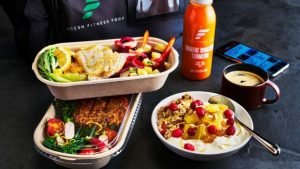Could health food delivery services revolutionise the way we prepare and consume food?
From fitness apps to wellness websites, young people today are becoming increasingly focused upon living a healthy lifestyle. The market value of health and wellness in the UK has steadily increased each year from 2015, and is worth €24,168.1 in 2019. One study cited by US healthcare system Sanford Health revealed that 53% of millennials (aged between 25 and 39 years old) valued health most in their lives, the second most popular option after family.
What millennials define as ‘health’ is also different to the views of older generations. A 2015 Goldman Sachs study found that 24% of millennials include ‘Eating Right’ in their definition of healthy, compared to just 14% of Generation X, and 12% of Baby Boomers, whilst the figures for ‘Not falling sick’ were much higher for older generations. To today’s young people – with many speculating that Generation Z may become the most health and lifestyle conscious generation yet – health is a lifestyle.

The Wellness Trend and Eating Habits
Food plays an important role in this, with Packaged Facts’ 2018 report ‘Looking Ahead to Gen Z: Demographic Patterns and Spending Trends’, finding that 18-24 year olds in the US are most likely to shop for organic foods and also to be vegetarians. The same report found that this demographic are more likely than previous generations to prepare quick meals, frozen food and microwave meals or ready prepared kits. These findings might be taken as a rough indicator for a general global trend, and suggest that two major priorities for young people with regards to food consumption are health and efficiency. Thus, health food delivery services, which can easily provide preprepared, organic meals are an ideal solution for today’s Millennial and Generation Z consumers in particular.
More from Business
- Top Industries for Investment in Colombia
- How To Start A Business In Slovenia
- Angel Investors Vs. Venture Capitalists: What’s the Difference?
- How To Launch A Startup In Stockholm
- Crypto Clash: Bitget Vs. Bybit
- 6 VoIP Features That Improve Customer Service
- Top Industries for Investment In Egypt
- Top Industries for Investment in Greece
What Healthy Food Delivery Services are Available?
A varied range of healthy delivery services are now available in the UK, as more and more businesses tap into the growing wellness lifestyle trend. These range from businesses that deliver snacks to your door, to vegan meal plan subscription services.
One of the first successful health food delivery startups in the UK is Graze. Founded in 2008, it sells ‘tasty, nutritious snacks for busy days’ and offers subscription snack boxes from £4.49 per box according to its website. All the customer needs to do is create an online account, set snack preferences and choose how frequently they wish to receive their items. This is easy and flexible, cutting down time spent shopping and preparing food, whilst allowing the customer to control how much, and how often they want the food delivered.

In 2013 the company expanded to the US. Its latest figures (which do not include 2019 reports) reveal that 2018 saw the company’s second highest revenues ever at £52.82 million. It was bought in February 2019 by Unilever and launched in Ireland in June 2019, acquiring over 5,000 customers just one month later. Graze products are also sold in supermarkets, and in 2016 Business Model Zoo reported that its largest customer group was now ‘Busy, suburban mums who are looking for convenient and healthy snacks for their kids’. This suggests that Millennials in particular are passing down their health conscious mindset to their children, possibly indicating that the next generation could become even more aware of wellness trends including those relating specifically to food.
Tapping into Vegal Lifestyles
Another health food delivery service in the UK is allplants. Launched in 2016, it delivers ‘100% plant-based’ vegan meals from frozen (to prevent waste) in recyclable packaging. It also offers gluten free, low calorie and high protein meals, once again meaning meals can be specially tailored by the customer. Each box contains six meals (you can order more than one box at the same time) and customers can sign up for deliveries every one, two, four or six weeks.
By subscribing, customers get 12% off their order. With the subscription in place a single portion box costs £40.50, averaging out to £6.75 per meal. Options range from Thai Green Curry to Shepherd’s Pie. Allplants also appear to be extremely successful. Investors raised £7.5 million in Series A funding in 2018, with the company’s LinkedIn noting that they are the highest funded vegan startup outside of the USA. The business also has a popular social media following with 43.9k Instagram followers and 44,714 Facebook Likes. By combining healthy food with not only efficiency, but also eco-friendly packaging and a waste free system, allplants appeals to those aiming to live a healthy lifestyle as well as those concerned with environmental issues.
Graze and allplants are joined in the market by a host of competitors including Balance Box, whose boxes include meals and snacks consisting of ‘seasonal, ethical and market fresh ingredients’ and The Pure Package which was launched in 2003 and describes itself as ‘London’s premier diet delivery service.’

Are There Any Disadvantages to Health Food Boxes?
For busy working people concerned with living healthily without the inconvenience of constant cooking and food preparation, services like allplants seem like an ideal solution. However, there are perhaps some disadvantages that ought to be considered. Most of these services are fairly expensive – even Balance Box’s ‘Lighter Plan’ works out at £22.99 for a day’s worth of food.
By comparison, in 2016-2017 the National Statistics Expenditure Report found that the average UK household spent £43.18 per person per week, including alcoholic drinks and meals out, meaning that a plans such as Balance Box are the same price for just two days’ worth of food cooked at home, with the occasional restaurant trip factored in. Some have also highlighted that receiving prepared meals could reduce one’s social life, with meals out with family and friends, a time for bonding and socialising, becoming increasingly rarefied due to cost as well as the delivery food already being available.
Health Food Services and the Future
Despite concerns over expense and social life, health food delivery services are currently succeeding. Millennials and Generation Z prioritise convenience and health when it comes to food. The Independent also reported in 2015 that 16-24 year olds spent more on food than any other age group, perhaps implying that cost will not heavily impact the current rise of health food deliveries. It looks as if these services could be the food of the future.



